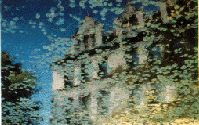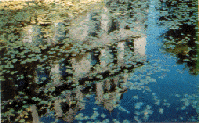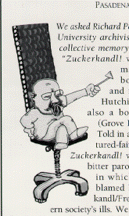 À la Rene Magritte
À la Rene Magritte À la Claude Monet
À la Claude Monet
 The University of Chicago Magazine June 1995
The University of Chicago Magazine June 1995
Eileen Ryan's photograph on the back cover of the April/95 Magazine, captioned "Found Art: Botany Pond à a la Claude Monet," should have been titled "Botany Pond à a la Rene Magritte." Unless you printed the photo upside down (perish the thought!), the building reflected in the pond, when viewed directly, is suspended in midair, upside down.
Allen M. Lenchek, SB'57
 À la Rene Magritte
À la Rene Magritte
 À la Claude Monet
À la Claude Monet
Several other sharp-eyed readers caught the mistake -- although there are some members of the editorial staff who prefer to think of the original positioning as artistic license. -- Ed.
Writers' Blocks," by Jane Chapman Martin, AM'90 (April/95), was a delightful piece for those of us who long again to be in the grasp of the Hyde Park/University of Chicago mystique. I would only like to recommend to my fellow readers another tome that deserves a place in Chicago's "bookcase full of potboilers, mysteries, [and] satires."
Coming to the Divinity School a few years ago -- fresh off the back of a Midwestern potato truck, if you will -- I was quite surprised to see a novel assigned for reading in Arthur Droge's "Introduction to the New Testament." In slow order, however, this country bumpkin came to learn more than he thought possible from such an approach. I have, in turn, recommended Martin Gardner's The Flight of Peter Fromm (Prometheus Books, Amherst) to many, both in and out of the Divinity School's family.
Almost autobiographically so for some students, the novel tells of a Karl Barth- loving, bumpkinish boy wonder from Oklahoma who comes to the Divinity School at mid-century. He becomes so divided in his loyalties -- between the biblical faith of his childhood and the seemingly cold reason of his professors -- that like his biblical namesake, Peter, he does not know whether he's coming or going. In the process of traversing from Wilmette to Woodlawn, he finds himself. Or does he lose himself? I guess that is for "you all" to decide.
Donald E. Heckman, MDV'94New Bedford, Massachusetts
Other readers noted the omission of The Flight of Peter Fromm, including Julian R. Goldsmith, SB'40, PhD'47, distinguished service professor emeritus of geophysical science. Goldsmith also wrote the author, Martin Gardner, AB'36, and received this response:
"Thanks for writing the alumni magazine about my novel....When I worked in the press-relations office at the U of C before World War II, I contributed an article to the Magazine on novels about the U of Chicago....The anonymous Gray Towers, about the sex lives of faculty members, is now a rare item. The professors have their names changed, but are easily recognizable. Maroon Tales, by the humorist Will Cuppy, is another curious volume...."
I enjoyed the article on the University of Chicago in literature, but was surprised not to have seen some mention of Native Son, by Richard Wright. A powerful story by a serious and often overlooked author, the book recounts the misadventures of a native son of Woodlawn who finds himself, due to a succession of developments increasingly beyond his control, drawn into the maelstrom of left-wing politics and race relations in Hyde Park, circa 1940. Despite the self-consciously noble sentiments of the U of C professor's family for which he works, Wright's antihero eventually pays with his life for accidentally killing the professor's daughter as she was trying to seduce him.
Native Son was made into a movie several years ago. I think it would make a fine addition to the Common Core reading lists.
Chuck Pollack, X'86Hartsdale, New York
Regarding University-based fiction, I was amused in the 1960s when I saw myself portrayed in Saul Bellow's Herzog. Must have been I -- who else taught comparative anatomy at the U of C in the early '60s and had a pet monkey? I did not know Bellow, but I used to take exotic animals out to the quadrangles in the early evening to play, and I am sure I was regarded as a campus character.
As if that were not enough, I apparently was a minor character in a TV movie, a somewhat fictionalized account of University students and their life in the U of C neighborhood (Marriage: Year One, 1971, with Sally Field.) It was written by Steve and Elinor Karpf, who later went to Hollywood and wrote some other movies and a soap opera. Well do I remember the scene in which they moved (with the help of their pals) into an apartment in a mixed neighborhood (gasp), actually on 61st Street. And I want to say that I may have been the geeky biologist buddy but I did not come on to Sally Field.
Richard A. Spieler, AB'52, PhD'62Fresno, California
I would like to bring to your attention the novel Presumed Dead by Hugh Holton. He is not too far away from the quads as he is the commander of Chicago's 2nd Police District. The story takes place in a fictitious Museum of Science and Industry, and a couple of U of C profs figure in the plot in a minor way. I recommend it .
Jan Finder, SM'64
The interview with President Sonnenschein ("A Conversation with Hugo Sonnenschein," April/95) was first-rate. He sounds like a real guy -- like Hutchins in my days: intense, committed to values, and doing what he can to bring them about.
Paul Carroll, AM'52Vilas, North Carolina
President Sonnenschein says that in 1960 a Ford cost about $2,500, about the same for that year's tuition and expenses at the University -- and that the cost both of the car and the education have risen at similar rates.
While a 1995 Ford Taurus costs about $19,000 -- not today's College costs of $25,000 -- the question the president needs to answer is, "Has the education provided in 1995 improved as much as the 1995 Ford compared to the 1960 model?"
Joseph Kimerling AB'49Birmingham, Alabama
For the record, Consumer Reports notes that a 1995 Ford Taurus SHO falls into the midsized-over-$25,000 range, while a 1995 Ford Taurus qualifies for the midsized-under $25,000 listing. -- Ed.
In the article on privatization of the Russian economy ("Investigations," April/95) I found the phrase "that rarest of things: a successful government program."
This is an absurd statement that should never appear in the magazine of a fine university. It is a phrase commonly used by free-market fanatics and others who wish to disregard the truth. Propaganda experts call the technique "the big lie." Repeat it enough and it becomes the perceived truth. Anyone but a fanatic will recognize the phrase is absurd.
What proportion of students admitted to the University has graduated from public schools? Can we assume these schools were successful government programs? How about Social Security, child labor laws, Desert Storm, the Apollo missions to the moon? The list is endless, if you think about it.
In the other room, the television tells us that the Federal Building in Oklahoma City was bombed by antigovernment militants. I wonder why these people think the government is so bad that innocent children and others can be killed in their protest? When I was educated at the University, we thought ourselves in pursuit of truth. Please think before editing.
Charles G. Bill, MBA'61Garden Grove, California
As mentioned in the article on Robie House ("Chicago Journal," April/95), I recall when the house's then-owner, a seminary, announced its intention to tear down the home, and Frank Lloyd Wright himself led the charge in opposition.
At one point, a media-type asked the Great Man if he was angry at the seminarians. He replied that, no, he was acting more in sorrow than in anger. After all, "one can't expect these theologians to understand spiritual things."
Peter O. Steege, JD'58Monaca, Pennsylvania
Is not Professor Martin Marty's Bibfeldt ("The Unbearable Lightness of Being Bibfeldt," February/95) blood brother to Robert Maynard Hutchins' Zuckerkandl!? How short is memory!
Will E. Layman, PhB'31Pasadena, California
We asked Richard Popp, assistant University archivist, to jog our collective memory, as follows: "Zuckerkandl! was an animated movie both written and narrated by Hutchins; there is also a book version (Grove Press, 1968). Told in a sort of fractured-fairy-tale form, Zuckerkandl! was a rather bitter parody of Freud in which Hutchins blamed Dr. Zuckerkandl/Freud for modern society's ills. We have a copy of the film in the archives, but only on 16 mm. The book is available in the Library's general stacks."

The above illustration, by John and Faith Hubley, is taken from the book.. -- Ed.
The University administration remains steadfast in its plan to replace the cushioned, lounge-like interior of the Harper Library North Reading Room ("Romper Room," "Playpen") with conference rooms for use by the Business School. Users of the room were not consulted in the decision to renovate, nor have efforts been made to find space for students displaced from this often-crowded room.
In reaction, not only did both Student Government and the Inter-House Council pass resolutions condemning the administration, but a petition containing almost 900 signatures was delivered to officials, who reacted with indifference. Alumni who fondly remember this comfortable study area should pressure the administration to preserve it.
Alanna Spehr, '96Chicago
Michael R. Jones, AM'83, PhD'88, assistant dean of the College, responds: On behalf of the College and the Graduate School of Business, please allow me to clarify our plans for the North Reading Room of Harper Library.
The room will be renovated this coming summer. Current seating and lounge space will be replaced with group study tables and comfortable chairs and sofas. As in the past, the room will be available equally to all students, and we expect College and GSB students to share the renovated space just as they share the current space. Library books will not be disturbed. All students will be able to reserve group study space, and we expect the College Core Tutors and the Little Red Schoolhouse will make regular use of it, along with study groups from the GSB and the College.
In the fall, the room will also contain some lockers for GSB students. In the long run, the GSB will find other space for these lockers, but GSB students have indicated that there is a critical need for lockers right now. In response to College student concerns, we are working to reduce locker space to the greatest extent possible and increase lounge and study space in the initial phase of the project. We expect to have an attractive new facility available for all students by the beginning of autumn quarter.
I never really knew Professor Edward Shils, X'37, who passed away this winter ("Deaths," April/95). I was merely one of his many admiring, even worshipful students. In those days, the mid-'60s, the Committee on Social Thought offices were located on the fifth floor. Most of us simply called the space "Heaven." Many shared the experience of speaking with Professor Shils in his book-invested office, his pink face looking kindly at us and the conversation truly inspiring.
A fellow student, however, had warned me about Professor Shils. One day in class, he said, you will by sheer chance say something that stimulates him, and he will say, "Yes, that is very interesting, and do you think you could come to see me in my office?" Once in the office, my friend then warned, he will ask three questions: And where do you come from? And where did you go to college? And why are you studying social sciences?
The warning was perfectly accurate. I sat there trembling, and Professor Shils began. "And where did you grow up?" "Chicago." "Good. And where did you go to college?" I already was growing sad that this great man would go through the same ritual with all students, as if with all his knowledge he could muster nothing spontaneously. "Harvard." "Good, and why are you studying social sciences?"
And then something broke inside me. Partly I was disappointed with him, and partly I was annoyed that, like so many others, I had been entreated to partake in a ritualistic charade of superficiality. "Well," I began somewhat defiantly, "it was either social sciences or professional baseball."
Suddenly, Edward Shils became nothing short of I. L. Peretz's Magician. For two hours he spoke of baseball. He revealed his knowledge of the game and, even more, painted a glorious portrait of the stands, the people, the stadiums, the aesthetics of the turf, the curve of the field, and the beloved Philadelphia teams of his childhood.
"I was a catcher, you know. I didn't have great skill, but I was plucky." The deadly ritual had ended and Edward Shils, whom I loved from that moment onward, became so wondrously alive I thought I would cry. The fifth-floor appellation was correct: This was heaven.
My final image of Professor Shils is of him walking down a Hyde Park street holding his son Adam's hand. I was close enough to hear him ask the boy about his day in school and see him listen intently to the response.
No ritual here; nothing but utter care and involvement. The man won numerous awards for his outstanding work; anyone who encountered him knew the sheer brilliance and astounding intellect of the man. But I dare say I may be one of the few people on earth who, without mitts and ball, actually played a game of catch with Edward Shils.
Thomas J. Cottle, AM'63, PhD'68Brookline, Massachusetts
I am responding to a reader's recollections ("Letters," February/95) about a public fight between Rudolph Carnap and Richard McKeon. The writer was amazed that Carnap "could treat anyone with such bitter disdain."
This reinforces for the umpteenth time my impression that philosophy has an overdeveloped hostile side. Reading the recommended philosophy journals in Swift Library in the '50s, I saw a lot of reviews that began with praise for the distinguished colleague, and how eagerly we awaited this book.
Then, that out of the way, we had vicious attacks on the reviewee's personal integrity. These little dramas had the life cycle of a dysfunctional marriage: Flattery followed by unlimited, personal, unprofessional attacks. Beethoven also got those reviews, meant to be gleeful great fun but found disgraceful by later generations.
It is notable that Richard McKeon, an architect of the College, opened up an ecumenical world where you profit from people's diversity, and understand it, instead of trying to stamp it out and waste everybody's life.
We learn and think better with cooperation than with intimidation. Then how much do we learn from philosophy still addicted to power struggles and abuse? For those souls who want a world freer of man's inhumanity to man, or woman, philosophy always seems a natural place to start. But philosophy won't be much help until it purges itself of its Stalins. I'm not holding my breath, but you never know.
Patrick Carey, AB'53New York City
I am working on a life and work of Freidrich Hayek, who taught in the Committee on Social Thought from 1950 to 1962, and who received the Nobel Prize in economics in 1974. The recollections of any former students or colleagues who would wish to share them would be greatly appreciated. (I am the author, incidentally, of four previous books in political science and economics.)
Alan EbensteinSanta Barbara, California 93105
The Magazine invites letters on the contents of the magazine or on topics related to the University. Letters for publication, which must be signed, may be edited for length and/or clarity. To ensure the widest range of voices, preference is given to letters of no more than 300 words.
Address letters to: Editor, University of Chicago Magazine, 5757 Woodlawn Ave., Chicago, IL 60637. The Internet address is: uchicago-magazine@uchicago.edu.